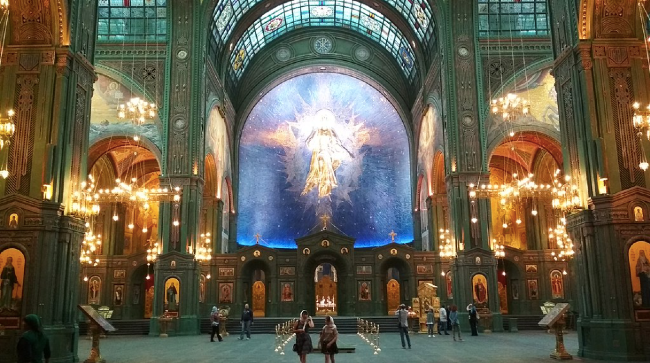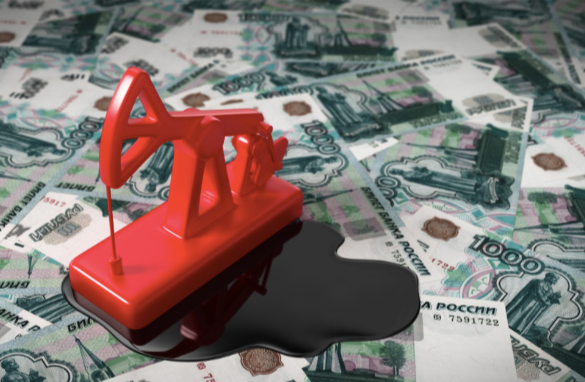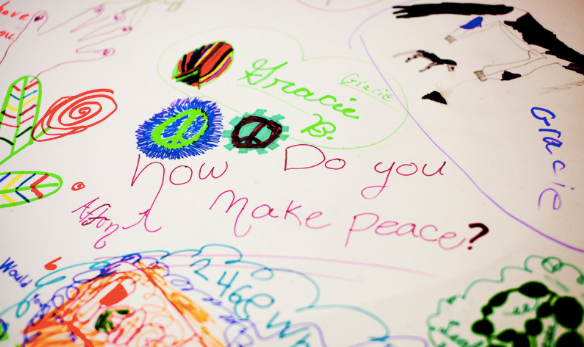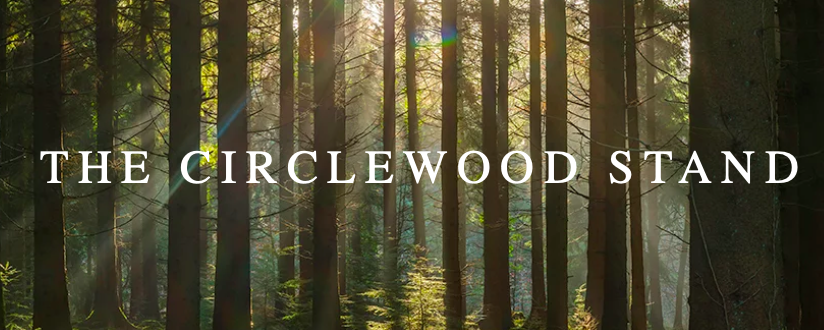Louise Conner recently wrote a beautiful introduction to the work of Ukrainian artist Maria Prymachenko. It challenged me to think deeply about the current invasion of Ukraine from the perspective of ecological discipleship. There are so many aspects of war that tear at the web of creation and are counter to the work of Christ to reconcile "all things, whether things on earth or things in heaven, by making peace through his blood, shed on the cross" (Col. 1:20).
In just a few weeks, we can see the tremendous damage that this particular war is wreaking: destruction of people, other creatures, and land; carelessness with nuclear material; toxic chemicals released by fire, spent munitions and broken machinery; diversion of money, energy, and focus from more life-building endeavors; deep physical, emotional, and spiritual trauma.
This war also shows us how interconnected and interdependent we are. Through the power of media, we are watching the conflict unfold in real time. Through the pervasiveness of global economics, our daily lives are impacted. Through the reality of global politics, our future is at stake.
While the war is being fought in Ukraine, it reaches out and touches every person and every place. From the perspective of ecological disciples, it asks us to reflect on what it means to follow Jesus in this moment, and what we might do to "make peace" in this fragile moment.
To that end, I want to highlight two forces behind the war that warrant our sustained attention, examine how they are connected, and suggest a few ways we might counter them through active resistance and peacemaking.
The Venom of Militant Religious Nationalism
The role that Russian religious nationalism plays in the current conflict is slowly getting more attention. The melding of church and state has been one of Putin's main political objectives. This is, in part, to counter the perceived abandonment of traditional Christian values and principles by liberal Western nations, but it is also to provide moral and spiritual justification for Putin's expansionist goals.
These two motivations come together in one of the goals of the war: to unite the Orthodox churches of Russia and Ukraine under a single patriarch in Moscow. This would give Russia control over some of the holiest sites in Orthodoxy, as well as millions of Ukrainian believers, and provide a veneer of spiritual unity to a growing Russian empire.
We might think that, although Christian unity is worth pursuing, using violence to achieve it is morally problematic and cannot be supported by followers of Jesus. The head of the Russian Orthodox Church, Patriarch Kirill, sees it differently. He has called Putin’s rule a “miracle of God,” refused to condemn the invasion, and recently framed it in apocalyptic terms as a war for morality and human salvation. He apparently needs to read the Sermon on the Mount again.
This vision of religious nationalism was literally cemented in place in 2020 when a massive, khaki-colored cathedral in a military theme park located an hour outside of Moscow was formally dedicated. Called "The Main Cathedral of the Russian Armed Forces," the building fuses religious, military, and political symbols into a vision of sanctified Russian dominance and superiority.

While many Russians, both Christian and non-Christian, do not approve of the cathedral, its power is hard to resist. Shortly after it opened, an altar server offered a stellar example of the dangerous ethnocentric theological blasphemy that militant religious nationalism invites:
In the war, our soldiers martyred themselves so that we could be free and independent. Only Russians are capable of sacrificing themselves to save humanity, just like Jesus did.
This venomous religious propaganda provides the spiritual and moral underpinning for the Kremlin's global ambitions - but it is oil and gas that provide the fuel.

The Entanglement of Fossil Fuels
Other than possessing the world's largest arsenal of nuclear weapons (Lord, have mercy), Russia's power on the world's stage is largely due to its production of gas and oil. Dependency on fossil fuels entangles many countries with Russia in ways that make responding to the war difficult. This is why the crippling economic sanctions levied against Russia have largely avoided oil and gas. A recent New York Times article notes:
At the moment, Russia supplies nearly 40 percent, on average, of the gas that European countries use for heat and electricity. For some countries, like Germany, that reliance is even higher, and that gives President Vladimir V. Putin of Russia outsize leverage in his war against Ukraine. It also makes it very hard for Europe (and the United States) to impose sanctions on Russia’s fossil fuel industry, the country’s main moneymaker.
It is bad enough that our addiction to fossil fuels continues to accelerate climate change; we can also now say that it is financing the war in Ukraine. During a recent United Nations panel discussion on the urgent need for action on climate change, Ukrainian scientist Svitlana Krakovska made a passionate speech in which she made these connections explicit:
Human-induced climate change and the war on Ukraine have the same roots—fossil fuels—and our dependence on them.
She also said that she and her colleagues would keep working on the recent IPCC climate report as long as they had internet and no bombs were falling on their heads, and added this courageous and challenging statement:
We will not surrender in Ukraine, and we hope the world will not surrender in building a climate-resilient future.
A Web of Destruction
Militant religious nationalism and fossil fuel addiction both stem from a domination mindset that views other people, other creatures, and the planet as objects to be conquered, converted, and used, rather than subjects to be respected and cared for.
When these strands intertwine, it is a recipe for disaster, which we are seeing unfold in real time in Ukraine. This destructive web, wrapped in flags, baptized by bishops, and fueled by greed, threatens to ensnare the world in a cycle of escalating conflict. But it does not have to, and there are steps we can take to weave a different web.
The interconnectedness and interdependence that make such a war possible also open up possibilities for peace. Our actions and attitudes make a difference; here are two strands we can weave together to counter this web of destruction with a web of peace.

Practicing Religious Transnationalism
Militant religious nationalism appears in many forms and many places, including my home country, the United States. Native Americans know well how religious justification for political expansion and economic gain can legitimize horrific acts of war and perpetuate ongoing trauma to people and places. This is an ongoing problem, and explains, in part, why some Christians have openly expressed admiration for Putin and sympathy towards the Russian invasion.
It is ok to love your country, but followers of Jesus must reject every form of Christian nationalism that supports the enforcement of political, military, social, or ecological hegemony. We must teach, preach, and practice the transnational (cross-border), more-than-human (cross-species), indiscriminate love of God. This is a love that actively seeks and promotes peace, which is not simply the absence of conflict but the presence of mutually supportive relationships that further God's desire for a flourishing world.
One of the most powerful ways to promote this kind of peace is through active solidarity with those who are suffering: Ukrainian refugees, Russian peace activists, targeted minorities, climate-threatened species, etc. If you want to explore how to do this through established, on-the-ground organizations, this article offers 27 options.
In addition to supporting direct aid, this may be the moment to see that focusing on our energy consumption is an act of long-term, comprehensive peacemaking.
Energy Solidarity
Writer and activist Bill McKibben offers this rationale for changing our energy consumption as a practical act of solidarity:
If Ukrainians can shiver in bomb shelters, we can put on a sweater or two and turn the thermostat down a few degrees. Or—if you’re in parts of the South or Midwest reporting unprecedented late-winter heat—you could turn up the thermostat a few degrees and let the AC rest. It’s nice that we’re lighting things up in blue and yellow—but we could turn off a lot of other lights.
He also suggests that we consider walking more, taking public transportation, carpooling, and switching to electric vehicles. On a larger scale, he suggests that the United States flood Europe with domestic heat pumps that would dramatically reduce their energy needs. While this compelling idea is unlikely to gain traction, large energy shifts are in the works. As of this writing, the United States has announced a ban on Russian energy imports, a move which will certainly make it easier for European countries to move in the same direction.
While this is cause to celebrate, simply shifting where we get our fossil fuel from doesn't solve the larger problem. McKibben reminds us that pursuing renewable energy can, in the tangled web of our current political, religious, and ecological crises, help weave a different future:
So now is the moment to remind ourselves that, in the last decade, scientists and engineers have dropped the cost of solar and windpower by an order of magnitude, to the point where it is some of the cheapest power on Earth. The best reason to deploy it immediately is to ward off the existential crisis that is climate change, and the second best is to stop the killing of nine million people annually who die from breathing in the particulates that fossil fuel combustion produces. But the third best reason – and perhaps the most plausible for rousing our leaders to action – is that it dramatically reduces the power of autocrats, dictators, and thugs.
Strand by Strand
In the face of war, it is natural to feel overwhelmed and powerless. But followers of Jesus are committed to pursuing the way of peace no matter how bleak things look, and trusting the results to God. So today, you can take a walk and pray for the victims of war, send money to a refugee ministry, ask your church leaders to consider putting solar panels on the roof, or challenge religious nationalism when you encounter it. It all matters - one strand at a time, connecting to others, weaving a web of peace.
With you on the Way,
James
To learn more about the religious dimensions of the war in Ukraine, I suggest reading this and this by Diana Butler Bass (her newsletter is worth subscribing to). To learn more about the role of fossil fuels in the conflict and the important choices we face, I suggest reading this by Naomi Klein.
Like what you are reading? Consider joining our supporter community, The Circlewood Stand. Click the image below to learn more.
